Unit6Howlonghaveyoubeencollectingshells-重点短语及句型总汇
Unit 6 How long have you been collecting shells
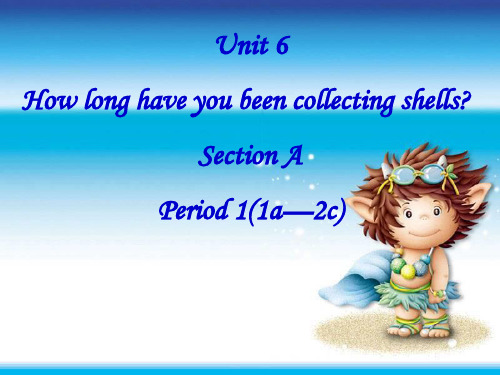
How long have you been …ing …? I have been ….. for/ since……..
2 hours
one night
1998-now
ten minutes
Jackie Chan
was born: 1954 act: 1961~ now
How long has Jackie Chan been acting? He has been acting for 50 years. He has been acting since 1961. He has been acting since 50 years ago.
5:00-5:30 p.m.
How long did he / she…? He / she …for…years.
1989 ~2011.7 played basketball
Yao Ming
1978 ~1997 played ping-pong
Deng Yaping
1976 ~2011.10.18 worked for Apple
Jobs
Li Na’s sports life
was born started playing tennis playing tennis 23 years
1982
1988 has been playing 2011
How long has she been playing tennis ?
She has been playing tennis since 1988.
Unit 6 How long have you been collecting shells?
Section A Period 1(1a—2c)
Unit6Howlonghaveyoubeencollectingshell

Unit 6 How long have you been collecting shell ?孙风梅Teaching goals:1.Words and expressions in this unit .2.How to use the present Perfect Progressive Tense.3.Patterns: How long have you been doing sth ?I have been doing sth since … .I have been doing sth for … (period of time) .4.Talk about how long you have been doing things.5.Talk about person’s hobbies.Important and difficult points:1.Words and expression in this unit .2.The differences between the three tenses:the Present Perfect Progressive Tense,the Simple Past Tense, the Present Progressive Tense.Teaching aids: teaching cards , pictures , a tape recorder .Unit6 How long have you been collecting shells? Period 1一、Knowledge Objects:(1)Key vocabulary: inline skating; marathon; skate; shell; collect(2)Key structures: —How long have you been skating?—I’ve been skating for five hours.(3)Listening practice二、Ability Object:1.To train students’ ability of listening and speaking.2.Teaching Key Points : Key vocabulary. Key structures. Listening practice.三、Teaching Difficulties: How to improve students’ listening ability.四、Pairwork.:五、Blackboard Design:Unit 6 How long have you been collecting shells?A: How long has Alison been skating? B: She’s been skating for five hours.A: How long did Sam skate? B: He skated for four hours.六、Teaching Procedures:Step ⅠGreet the class and check the homework.Step ⅡShow the new words on the screen. Teach the new words. Read the new words to students and ask students to repeat.Step ⅢSection A Draw a long horizontal line across the board. Say, This is called a time line. It shows the years from 19- to the present. Let’s put some information about ourselves on the time line.T: Maria, when did you start studying English? S1:1997.T: Maria started studying English in 1997.(Write the words Maria started English above the date 1997 on the time line.)In this unit we’re going to talk about how long we’ve been doing things. Maria, how long have you been studying English?(Point to the date 1997 on the time line.)S1:Since 1997.T:(Look at the class.)Correct. Maria has been studying English since 1997.(Point to the starting date and run the finger along the years up to the present year.)Class repeat. Maria has been studying English since 1997.Ss: Maria has been studying English since 1997.Repeat the activity using different dates for several other students. Use a different situation, such as When did you start to ride a bicycle? or When did you start to baby-sit? if these questions are more appropriate. Each time ask the class to repeat a sentence, point to the starting date and run the finger along the years up to the present year.Step Ⅳ1aThis activity provides oral practice using the target language.Go through the instructions with the class. Say, You will be talking with other students about some things you did in the last 24 hours.Write the words at and for on the blackboard. Say, You will be using the words at and for in some answers.Divide the students into some groups. Let students look at the three questions and read them to the class.(1)How long did you sleep last night? (2)When did you start class today?(3)How long have you been in class today?Then get students to ask and answer these questions in groups. Let them look at the words at and for on the blackboard. Say, Use the two words in sentences like this: I started class at 10:00.I slept for ten hours.While students work in groups, move around the room checking their progress and offering help as needed.Ask the class each question and let several different students answer. Help the students phrase responses using the words at and for correctly.Step Ⅴ1bThis activity gives students practice in understanding the target language in spoken conversation.First tell students, We’re going to listen to a recording of a reporter talking to the participants in an inline skating marathon.Let students look at the picture and tell what is happening. Help the students understand that the students in the picture are at a skating marathon. Then discuss with students what a marathon is.(It’s a contest to see who can do something—run or dance or skate—the longest without stopping.)Ask a student to read the instructions, and the name in the chart. Then say, You will write sentences about these people according to the recording.Get a student to read the sample answers.I’ve been skating for five hours. I skated for four hours.T: What word comes before the number of hours?S: For.T: That’s right. We use the word for when we talk about a number of hours. We say for five hours or for ten days.Play the recording for the first time. This time students only listen. When play it a second time, say, This time listen to the tape carefully and write the sentences in the chart.Correct the answers.AnswersAlison: I’ve been skating for five hours.Sam: I skated for four hours.Victor: I’ve been skating for five hours.Celia: I skated for two hours.Step Ⅵ1c PairworkThis activity provides guided speaking and listening practice using the target language.Ask a student to read the instructions aloud. And let students look at the picture in Activity 1a.Have two students read the example in sample dialogue in Activity 1c.Then say, Now work with your partner. Begin with reading the conversation in the box with your partner. Then make a conversation about the people in the picture. You can use the names and sentences in Activity 1b.Are you clear? OK. Begin, please.As students work, move around the room, checking their progress. Offer language support if necessary.At the end ask several pairs of students to say their conversations to the class. Give them little presents if they do their work better.Step ⅦOptional ActivityWrite these words on the board in random order: how, long, have, you, been, studying, English, going to school, playing soccer, riding a bicycle. Then give a student a pointer and ask him or her to tap the words one by one to make a question. For example the student might tap these words: how...long...have...you...been...riding...a...bicycle. Then the student calls on another student to answer the question. Give several students a chance to tap out questions. Step ⅧSummary and HomeworkToday we’ve learned some key vocabulary and structures. Continue to make conversations with your partner after class. Next time I’ll ask some pairs to read your conversations to the class again.Step Ⅸ:comments after class.(The End)。
unit6 How long have you been collecting shells
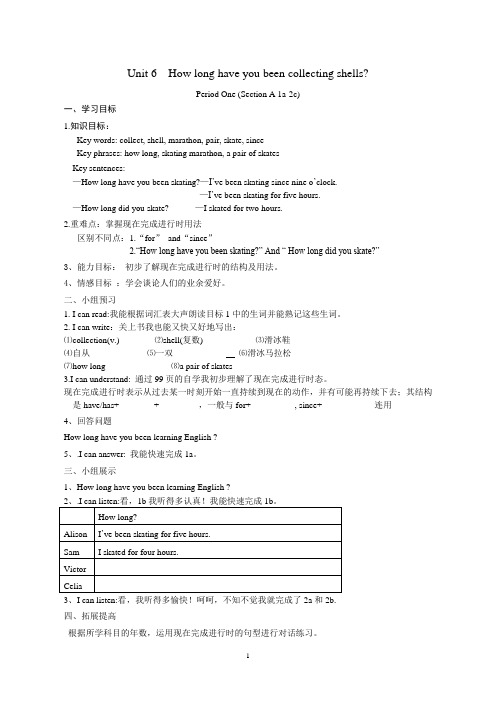
Unit 6 How long have you been collecting shells?Period One (Section A 1a-2c)一、学习目标1.知识目标:Key words: collect, shell, marathon, pair, skate, sinceKey phrases: how long, skating marathon, a pair of skatesKey sentences:—How long have you been skating?—I’ve been skating since nine o’clock.—I’ve been skating for five hours.—How long did you skate? —I skated for two hours.2.重难点:掌握现在完成进行时用法区别不同点:1.“for”and“since”2.“How long have you been skating?” And “ How long did you skate?”3、能力目标:初步了解现在完成进行时的结构及用法。
4、情感目标:学会谈论人们的业余爱好。
二、小组预习1. I can read:我能根据词汇表大声朗读目标1中的生词并能熟记这些生词。
2. I can write:关上书我也能又快又好地写出:⑴collection(v.)_______ ⑵shell(复数)_________ ⑶滑冰鞋____________⑷自从____________ ⑸一双____________ ⑹滑冰马拉松_____________⑺how long__________ ⑻a pair of skates___________3.I can understand: 通过99页的自学我初步理解了现在完成进行时态。
现在完成进行时表示从过去某一时刻开始一直持续到现在的动作,并有可能再持续下去;其结构是have/has+________+_________,一般与for+__________, since+____________连用4、回答问题How long have you been learning English ?5、.I can answer: 我能快速完成1a。
Unit 6 How long have you been collecting shells
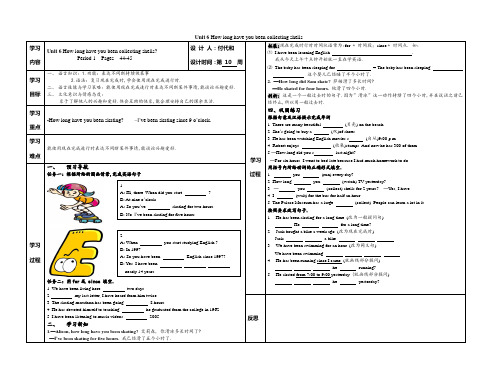
一、 语言知识: 1.功能:表达不间断持续做某事 2.语法:复习现在完成时,学会使用现在完成进行时. 二、 语言技能与学习策略: 能使用现在完成进行时表达不间断某件事情,能谈论兴趣爱好. 三、 文化意识与情感态度: 乐于了解他人的兴趣和爱好.体会互助的快乐,能合理安排自己的课余生活.
-How long have you been skating?
学习 过程
学习 过程
2. A: When you start studying English ? B: In 1997. A: So you have been English since 1997? B: Yes. I have been nearly 14 years. 任务二:用 for 或 since 填空. 1. We have been living here two days. 2. my last letter, I have heard from him twice. 3. The skating marathon has been going 8 hours. 4. He has devoted himself to teaching he graduated from the college in 1962. 5. I have been listening to music videos 2005.
学习 内容 学习 目标 学习 重点 学习 难点
Unit 6 How long have you been collecting shells? Period 1 Pages 44-45
Unit 6 How long have you been collecting shells 拓展:现在完成时行时时间状语常为:for + 时间段; since + 时间点. 如: 设 计 人:付代和 ⑴ I have been learning English . 设计时间:第 10 周
Unit 6How long have you been collecting shells
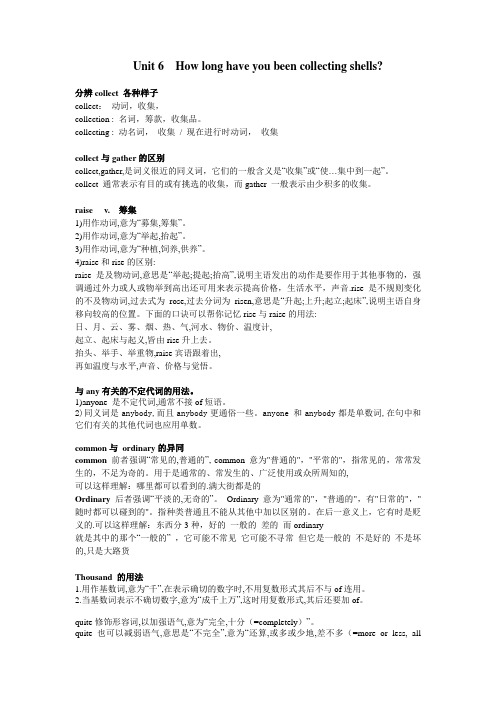
Unit 6How long have you been collecting shells?分辨collect 各种样子collect:动词,收集,collection : 名词,筹款,收集品。
collecting : 动名词,收集/ 现在进行时动词,收集collect与gather的区别collect,gather,是词义很近的同义词,它们的一般含义是“收集”或“使…集中到一起”。
collect 通常表示有目的或有挑选的收集,而gather 一般表示由少积多的收集。
raise v. 筹集1)用作动词,意为“募集,筹集”。
2)用作动词,意为“举起,抬起”。
3)用作动词,意为“种植,饲养,供养”。
4)raise和rise的区别:raise 是及物动词,意思是“举起;提起;抬高”,说明主语发出的动作是要作用于其他事物的,强调通过外力或人或物举到高出还可用来表示提高价格,生活水平,声音.rise 是不规则变化的不及物动词,过去式为rose,过去分词为risen,意思是“升起;上升;起立;起床”,说明主语自身移向较高的位置。
下面的口诀可以帮你记忆rise与raise的用法:日、月、云、雾、烟、热、气,河水、物价、温度计,起立、起床与起义,皆由rise升上去。
抬头、举手、举重物,raise宾语跟着出,再如温度与水平,声音、价格与觉悟。
与any有关的不定代词的用法。
1)anyone 是不定代词,通常不接of短语。
2)同义词是anybody,而且anybody更通俗一些。
anyone 和anybody都是单数词,在句中和它们有关的其他代词也应用单数。
common与ordinary的异同common 前者强调“常见的,普通的”, common 意为"普通的","平常的",指常见的,常常发生的,不足为奇的。
用于是通常的、常发生的、广泛使用或众所周知的,可以这样理解:哪里都可以看到的.满大街都是的Ordinary 后者强调“平淡的,无奇的”。
Unit 6 How long have you been collecting shells 教案(人教版八年级下) (9)
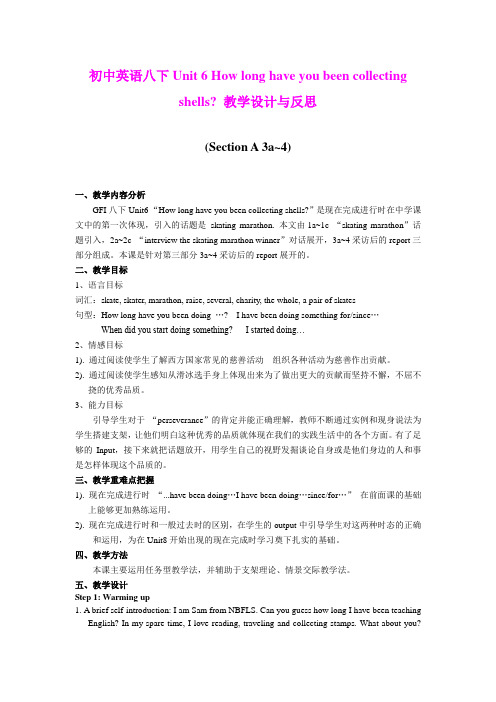
初中英语八下Unit 6 How long have you been collectingshells? 教学设计与反思(Section A 3a~4)一、教学内容分析GFI八下Unit6-“How long have you been collecting shells?”是现在完成进行时在中学课文中的第一次体现,引入的话题是skating marathon. 本文由1a~1c “skating marathon”话题引入,2a~2c “interview the skating marathon winner”对话展开,3a~4采访后的report三部分组成。
本课是针对第三部分3a~4采访后的report展开的。
二、教学目标1、语言目标词汇:skate, skater, marathon, raise, several, charity, the whole, a pair of skates句型:How long have you been doing …? I have been doing something for/since…When did you start doing something? I started doing…2、情感目标1). 通过阅读使学生了解西方国家常见的慈善活动---组织各种活动为慈善作出贡献。
2). 通过阅读使学生感知从滑冰选手身上体现出来为了做出更大的贡献而坚持不懈,不屈不挠的优秀品质。
3、能力目标引导学生对于“perseverance”的肯定并能正确理解,教师不断通过实例和现身说法为学生搭建支架,让他们明白这种优秀的品质就体现在我们的实践生活中的各个方面。
有了足够的Input,接下来就把话题放开,用学生自己的视野发掘谈论自身或是他们身边的人和事是怎样体现这个品质的。
三、教学重难点把握1). 现在完成进行时“...have been doing…I have been doing…since/for…”在前面课的基础上能够更加熟练运用。
八年级英语下册 unit6 How long have you been collecting sh

八年级英语下unit6 How long have you been collectingshells? (period 1)教材分析:在课改的背景下,本套教材避免了传统课程的缺点,强调了学生的兴趣、经验等,能结合实际,贴近生活,插图生动活泼,重视了学生的情感。
本节课U nit 6, Book IV, the topic is“ How long have you been collecting she lls?”第一课时是一堂以听说课为主的课,本课是该项语法教学的第一课,要对学生进行正确的语言输入,为以后的教学打下坚实的基础。
现在完成时与现在完成进行时的区别不易理解,因而如何运用现在完成进行时也为难点和关键点。
主要谈论人们做某事持续多长时间,以及人们的业余爱好,培养健康的爱好。
我强调英语课程要从学生的学习兴趣、生活经验和认知水平出发,倡导自主、实践、参与、合作与交流的学习方式和任务型的教学途径,发展学生的综合语言运用能力。
学生分析:我校学生生源由城乡两部分结合构成,学生的整体英语水平一般,英语交际的能力比较弱。
但本单元的教学是在学习了第九单元“现在完成时”的基础上教学,来学习“现在完成进行时”,这对学生理解时态方面水到渠成,但需要合理的引导。
而且学生的思维活跃,有参与意识,所以只要教学设计有一定的梯度,给学生打起台阶,一旦会表达,就非常喜欢表达自己的思想, 能够主动的配合老师,愿意开口讲。
设计理念:1、以听说训练为主线,通过看、听、说、演练、动手练等一系列教学活动,使学生获得最基本的英语听说能力,并在教学中充分激发学生强烈的学习愿望,在注重学生知识能力发展的同时,特别强调学生人格的发展和思维的发展。
2、通过各种各样的教学活动,如:记忆力挑战、教师个人的资料、学生喜欢的成龙的信息、表演对话、回答问题、讨论等形式,努力倡导学生积极参与,让学生在学习过程中不仅能建构知识,提高语言能力,而且通过感知、体验、实践、参与和合作探究等方式完成任务和实现目标。
Unit 6 How long have you been collection shells
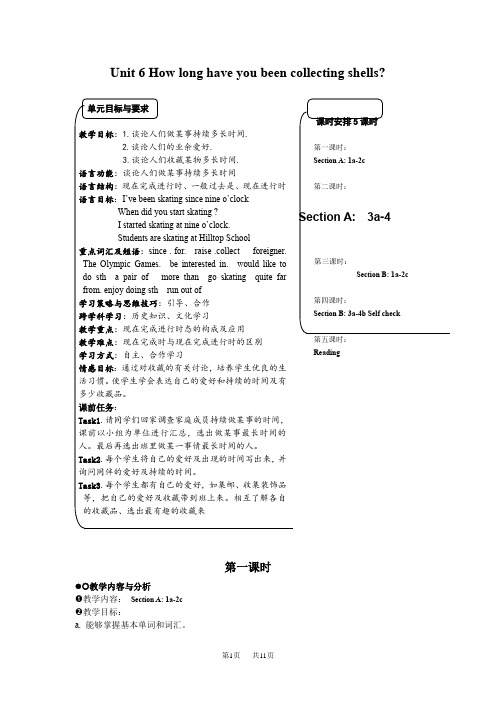
Unit 6 How long have you been collecting shells?第一课时●教学内容与分析❶教学内容:Section A: 1a-2c❷教学目标:a. 能够掌握基本单词和词汇。
第五课时:Readingb.能够运用基本句型进行提问。
学习任务:我的爱好目的:通过学生小组活动,调查彼此的爱好及持续的时间。
学会使用for 和 since表达自己的爱好持续的时间,培养学生应用英语进行交际的能力。
语言技能:listening .speaking .reading and writing语言知识:现在完成进行时的用法及复习一般过去时提示词语及句型:skate, collect, What’s your hobby? I like…How long have you been skating?I have been skating since nine o’clock/for five years.How long did you……? When did you ……●教学重点、难点分析:❶教学重点:基本单词,词汇和句型❷教学难点:能够运用现在完成进行时谈论自己的爱好及持续时间●课前准备❶本课时的教学课件●教学设计教学步骤建议和说明↘热身/复习(Warm-up/Revision)❶ Greetings.❷ Talk with students about the following:1.Did you sleep well last night?2.How long did you sleep last night ?3.When did you start class today ?4.How long have you been in class today?Help the students to answer: I have been in class for…↘呈现/操练(Presentation/Practice)❶Draw a long horizontal line on the blackboard. Say, This is called a time line. It shows the years from 19-to the present. Let’s put some information about ourselves on the time line.T: Maria, when did you start studying English?S1: .T: Maria started studying English in .(Write the words Maria started English above the date on the time line.)Maria has been studying English since . (class repeat)❷Repeat the activity using different dates for several other students. Use a different situation, such as When did you start to ride a bicycle? or When did you start to baby-sit? if these questions are more appropriate. Each time ask the class to repeat a sentence, point to the starting date and run the finger along the years up to the present year.❸学生两人一组问答从平常的谈话中轻松导入本课句型,信息沟使谈话非常真实,而又浅显易懂。
- 1、下载文档前请自行甄别文档内容的完整性,平台不提供额外的编辑、内容补充、找答案等附加服务。
- 2、"仅部分预览"的文档,不可在线预览部分如存在完整性等问题,可反馈申请退款(可完整预览的文档不适用该条件!)。
- 3、如文档侵犯您的权益,请联系客服反馈,我们会尽快为您处理(人工客服工作时间:9:00-18:30)。
Unit6Howlonghaveyoubeencollectingshel ls?重点短语及句型总汇
Unit6Holonghaveyoubeencollectingshells?重点短语及句型总汇
Unit6Holonghaveyoubeencollectingshells?
raiseoneyfor筹钱
collectstaps集邮
runoutof…用尽
bytheay顺便说一下
ontheayto..在…的路上
beinterestedin对…感兴趣
orethan=over超过
flyites放风筝
startclass开始上
0.startasnoglobecollector’sclub开办雪球仪收集者俱乐部
1.theostonhobby最普通的爱好
listentousicvideos听音乐碟片
anizeatalentshotoraiseoneyforcharity为慈善机构捐钱而举办的才艺展示
extraEnglishlessons额外的英语
haveproblesiththelanguage语言方面有问题
thecapitalofHeilongjiangProvince黑龙江的省会
aninterestingcityithacolorfulhistory一个有着丰富多彩历史文化的有趣的城市
threeandahalfyears=threeyearsandahalf三年半
apairofsates/shoes/glasses/trousers/jeans一双滑冰鞋/一双鞋/一副眼镜/一条裤子/牛仔裤
lHouchisapairofsates/shoes/glasses/trousers/jeans?
=Houchdoesapairofsates/shoes/glasses/trousers/jeans cost?
lHoucharethesates/shoes/glasses/trousers/jeans?
=Houchdothesates/shoes/glasses/trousers/jeanscost?
本单元目标句型:
Holonghaveyoubeensating?你滑冰有多长时间了?
I’vebeensatingsincenineo’cloc./sinceIasfouryearsold.
我从九点一直滑到现在/我从四岁一直滑到现在。
I’vebeensatingforfivehours.我一直滑了五小时。
TheoreIlearnaboutchinesehistory,theoreIenjoylivingi nchina.
我对中国的历史了解得越多,我就越喜欢住在中国。
asthisyourfirstsatingarathon?No,Isatedinaarathonlas tyear.
hendidyougetyourfirstpairofsates?
Alisonasthefirstonetostartandhasbeensatingforthehol efivehours.
Alison是个开始并且已经滑了整整5个小时。
I’talingtoyoufrotheHilltopSchoolSatingarathon.
Foreveryhourtheysate,eachstudentraisestenyuanforcha rity.
每滑一个小时,每位学生可为慈善事业筹集10元钱。
0.Thansforsendingethesnoglobeoftheonster.InfactIthi nit’sprobablyyfavorite.
谢谢你送我的怪物雪球仪。
事实上,我想它可能是我的最爱。
1.yosaysIhavetostop,becausee’
verunoutofrootostorethe.
妈妈说我必须停止了,因为我们已经没有地方来存放他们了。
ThefirstoneIevergotasabirthdaycaesnoglobeonytelfthb irthday.
我得到的个雪球仪是我十二岁生日得到的生日蛋糕雪球仪。
3.Iparticularlyloveglobesithanials.Ifyounoanyoneels ehocollectsthe,pleasetelle.
我特别喜欢动物雪球仪。
如果你知道其他人收集他们的话,请告诉我们。
Bytheay,hat’syourhobby?
I’interestedinthejobasariter.
Theschoolnespaperneedsariter.eillgiveyoudifferentto picstochoosefro.Togetthejob,pleaseanserthesefourque stions.
校报需要一个撰稿人。
我们会给你一些不同的话题来选择。
要得到这份工作,请回答这样四个问题。
Hoanychinesedynastiescanyouthinof?你能想起多少
中国朝代?
canyouthinoffaouscharactersfrothehistoryofothercoun tries?aealist.
从其他国家历史中,你能记起一些著名人物吗?列个表。
Infact,thefirstjesprobablycaetoaifengorethanathousa ndyearsagoandereeledbytheSongEperor.
事实上,批犹太人可能在一千多年前就来到开封而且受到宋朝皇帝的欢迎。
0.ThereissoeEuropeaninfluenceinthecity,andsoeoftheo ldbuildingsinHarbinareinRussianstyle.这个城市有欧洲文化的影响,而且哈尔滨的一些老建筑还是俄罗斯风格的。
1.Foraforeignerliee,theoreIlearnaboutchineseculture ,theoreIenjoylivinginchina.
对于一个像我一样的外国人来说,我对中国文化了解越多,我就越喜欢住在中国。
2.AndalthoughIlivequitefarfroBeijing,I’certainIillbeherefortheolypicGaesinXX.
尽管我住得离北京很远,但我相信XX年奥运会我一定
在这儿。
本单元语法讲解
现在完成进行时:表示从过去某时开始到现在这一段时间里一直在延续的动作。
现在完成进行式结构:have/has+been+doing/
Ihavebeenritingthelettersincethen.从那时起我一直在写这封信。
Ihavebeencollectingstapsfortenyears.自从10年前我就收集邮票了。
Holonghaveyoubeenlivinghere?你在这儿已经住了多长时间了。
现在完成进行时和现在完成时的区别:
现在完成进行时比现在完成时更强调动作的延续性:
如果没有时间强调,现在完成进行时表示动作仍在进行,现在完成时则表示动作已经结束,
现在完成进行时一般不适用于表状态的动词,而现在完成时则可:。
